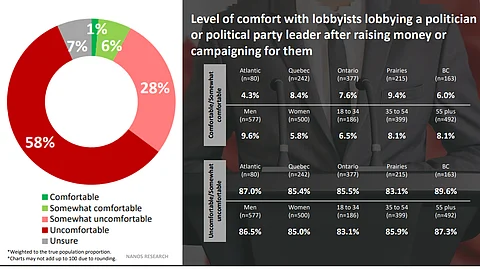

A national survey conducted by Nanos Research for Democracy Watch shows an overwhelming number of Canadians are uncomfortable about lobbyists campaigning for political parties that they subsequently lobby.
The survey results show that 84-87% of Canadians surveyed think:
(i) that a politician who receives undisclosed assistance (fundraising, campaigning, event organizing etc.) from a lobbyist is less likely or somewhat less likely to act in the public interest;
(ii) that they are uncomfortable or somewhat uncomfortable with a lobbyist lobbying a politician within 1 to 2 years after assisting the politician;
(iii) that it is important to know who has lobbied a politician, and how much they have been lobbied, when deciding which government policies to support and who to vote for, and;
(iv) that it is important to know whether a lobbyist has been given an exemption by the Commissioner of Lobbying to the rules that limit the value of gifts given to politicians, and that prohibit a lobbyist from lobbying for 1 to 2 years after assisting a politician.
As well, about 69% of people surveyed said they think that a politician who receives undisclosed gifts worth only up to $200 a year from a lobbyist is less likely or somewhat less likely to act in the public interest.
“A large majority of voters are understandably concerned about lobbyists secretly fundraising, campaigning and doing favours for politicians and political parties, and then asking them to return the favours soon afterwards,” said Duff Conacher, Co-founder of Democracy Watch. “All the federal parties should disclose before election day the list of everyone who has fundraised or campaigned or assisted them in any significant way in the past year, including during the Liberal Party leadership contest, as voters have a right to know before they vote who has bankrolled and done other favours for each party, and who each party owes.”
Democracy Watch has contacted all federal parties calling on them to, before election day, disclose everyone who has fundraised or campaigned or assisted them in any significant way in the past year, including during the Liberal Party leadership contest.
The organization says that "secret, unethical lobbying" is legal in federal politics because of a “dirty dozen” huge secret lobbying loopholes in the federal lobbying law that all federal parties have failed to close. The organization also complains that the Commissioner of Lobbying and MPs from all parties gutted key ethical lobbying rules in the Lobbyists’ Code of Conduct in 2023 even though 26 citizen groups with a total membership of more than one million Canadians, and more than 20,000 voters, and dozens of law, politics and ethics professors and lawyers opposed gutting the rules.
The “dirty dozen” secret lobbying loopholes allow lobbyists to secretly campaign for and/or secretly assist a politician or party in significant ways and lobby them at the same time, and to secretly fundraise an unlimited amount of money for a politician or party and/or secretly campaign for them full-time, and then lobby them within one to two years afterwards. The Commissioner of Lobbying can also secretly reduce that “cooling-off” time period, and also give secret exemptions that allow lobbyists to give expensive gifts and meals to politicians and government officials.
Nanos did the hybrid telephone and online random survey of 1,077 adult Canadians between January 31 and February 3, 2025, as part of an omnibus survey. The margin of error for the survey is ±3.0 percentage points, 19 times out of 20.
